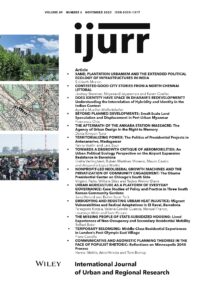Recently, large parts of India and the global South have witnessed widespread sand extraction from rural sites for urban infrastructure projects, causing extensive environmental damage. Critical scholarship has theorized these sites as new extractive frontiers that facilitate the needs of green energy transitions and planetary urbanization. In this article, I offer a postcolonial decentering of this narrative by examining the commodity chain of ‘m-sand’ or manufactured sand, which binds urban infrastructures in Kochi city in Kerala, India to sand extraction sites in the rural Western Ghat mountain ecologies of southwest India. I argue that sand extraction sites are better analyzed through the lens of ‘plantation urbanism’, a concept that accounts for the failure of colonial-era Western Ghat plantation economies in the free-market era and their ensuing conversion to sand extraction sites. Plantation urbanism also foregrounds how colonial plantation logics shape the production of urban space in Kochi via sand’s commodity chain.
Details
Written by:
Siddharth Menon
Digital Object Identifier (DOI)
https://doi.org/10.1111/1468-2427.13363
About DOI

